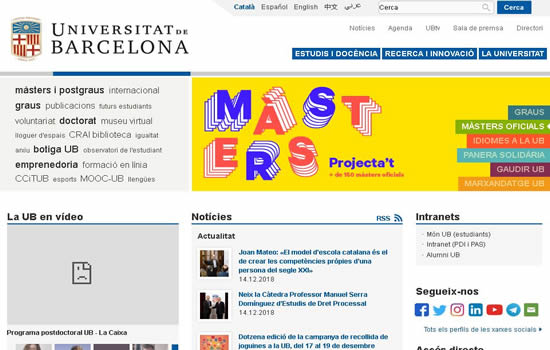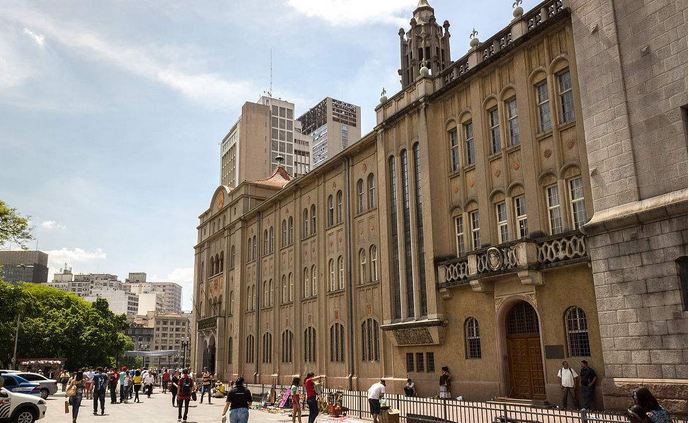选择热点
 荷兰莱顿大学
荷兰莱顿大学 西班牙巴塞罗那大学
西班牙巴塞罗那大学 巴西圣保罗大学 University of Sao Paulo, Brazil
巴西圣保罗大学 University of Sao Paulo, Brazil 台湾南华大学 University of South China in Taiwan
台湾南华大学 University of South China in Taiwan 科技大学 National University of Defense Technology
科技大学 National University of Defense Technology 南京大学 Nanjing University
南京大学 Nanjing University 上海复旦大学 Fudan University
上海复旦大学 Fudan University 泗水大学(Ubaya)
泗水大学(Ubaya) 印尼大学 universitas indonesia
印尼大学 universitas indonesia 越南某大学 Vietnam National University
越南某大学 Vietnam National University 菲律宾大学 University Of The Philippines
菲律宾大学 University Of The Philippines
英语故事:King Cormac's Cup
发布时间:2025-01-06
来源:大学网站
阅读是一切知识的基础,想要持续阅读,兴趣很关键。
以下是小编整理的关于英语故事:King Cormac's Cup的内容,希望你能喜欢!
King Cormac had faults.
They were not what would be faults in you or me, but they were faults in a King.
In the first place, he believed every tale that was told him.
In the second place, he would give anything he had for anything that was brought to him.
And in the third place, he governed his men of loreand learning so slackly that they neither did things nor explained things.
The first of his faults led to the spread of lying among his people.
The second led to the people seeking after new things instead of getting to like the things they had already.
And the third fault led to the spread of light-mindedness and want of sense among the people.
So now you know King Cormac's faults.
But he was a good King, and in those days people knew whether they had or whether they hadn't a good King over them.
If they had, wheat grew heavily in the ear, acornsfell thickly in the forest, nuts grew plentifullyin the dells, milk poured into the pails, and bees filled their hives with honey.
And if they hadn't a good King, they lacked much wheat, acorns, nuts, milk, and honey.
In Cormac's day, people had full benefit of field and forest, of dell, dairy and hive.
And he was as fine a figure of a King as you would see in a year and a day's traveling.
He stood six feet tall; he had clear gray eyes and a golden beard worn in the fashion that the Kings of Ireland wore their beards.
Well, there stood Cormac, son of Art, looking over the ramparts of Tara on a day of May.
So clear and quiet was that first of May that although he was listening to a person who was telling him about the Blue Men of Africa he could have heard the bees humming in the clover-bloom only for the way that his men of lore and learning were arguing with each other and complaining of the ways others had treated them.
Cormac should have worn a royal mantleof crimsonfringed with gold, but he had given it to someone in exchange for the mantle he had on now -- one of green fringed with silver.
On his body was a tunicembroideredwith gold, and on his feet were sandals of bronze laced with golden thongsof his golden beard, and so anyone would know that he was not only a King of Ireland, but the High King of Ireland, and had a right to be standingthere and looking over the ramparts of Tara on that May-day.
He saw one coming across the plain who wore the garband carried the bag of a jugglerthe King and the men of lore and learning, and then, by the King's favor, opened his bag.
He took out, not the balls they were expecting him to toss up and catch, but a silver branch on which were golden apples.
He held it up; it was lovely to look at.
He shook it.
The golden apples made a pealand answering them and they listened, every man of them entranced.
The King cried out "No!
" when the juggler was about to put the silver branch back into his bag.
"The Bell-branch must remain with me," he said.
"Anything you ask as payment for leaving it shall be given you -- it will be all that a King can give.
" "I shall ask for three things in exchange," said the juggler, "and I shall ask for the first of them when you see me again.
" He took up his bag; none were able to tell what direction he took when he left the ramparts of Tara; he was gone when they came out of their enchantmentthey were in before, felt happy with a happiness that they never thought they could have.
And if anyone in Tara were wounded or troubled with disease, the King had only to shake the Bell-branch and he or she would fall into an untroubled sleep, and would be sound and well again upon awakeningare due me, and I shall ask for one of them today -- Ailbe, your fair young daughter.
" King Cormac sighed a heavy sigh when he heard this.
"A promise is a promise," he said, and he sent for Ailbe.
And when she came upon the ramparts he put her hand into the juggler's hand.
He with a sweep of his arm, put his cloak around her, and in a minute the girl and the stranger were gone from the rampart; none of the King's guards knew in what direction they had gone.
When the heavy-hearted King told his wife what had befallen she raised a wailall over Tara.
Cormac shook the Bell-branch and the wailing ceased; everyone, even Ailbe's mother, hearing the music of the peal, felt that loss was far from them and happiness beside them.
When the music ceased, such was their entrancement, the loss of Ailbe was hardly remembered.
May-day came again, and King Cormac, looking over the rampart, saw the juggler coming across the plain of Tara, and knew that the second of the boons would be claimed by him.
He said, "What would you have from me now?
" The juggler answered, "Your son, Cairbre.
" "A promise is a promise," said King Cormac, "and even this one must be kept.
" He sent for his son, and when the brave youth stepped to the rampart, Cormac put his hand into the other's hand.
Then the juggler flung his cloak about the King's son, and in a minute the pair were gone, and the guards did not know in what direction.
Cormac was heavy-hearted; he told his wife what had befallen and she raised a wail, and when they knew what she was wailing for the women of Tara wailedtoo, and there was wailing in hall and chamberand it shall be given you, for a promise is a promise.
" "A promise is a promise," said the juggler, "and I have come to get the third boon promised me.
I ask you to let me have Eithne, your wife.
" #p#The King, setting command upon himself, sent for his wife; when she came he put her hand into the other's hand.
Then the juggler flung his cloak about her, and in a minute he and she were gone, and Cormac who had been alone by the ramparts did not know what direction they had gone in.
He groanedheavily.
But he knew that groaningwas no use, and taking his sword in his hand and filled with a great passion of grief and anger, he sprang off the ramparts of Tara and ran across the plain.
The clear light of May-day had been on everything, but as he went on a mist fell down or rose up.
It was light at first and was only about his feet, but it became heavier and thicker and thicker and heavier.
He heard birds' cries coming through it.
He went on and on and came suddenly out of the mist.
And now a lovely light was on everything.
But the plain he was on was strange to Cormac.
The grass was bright; there were white blossoms on the hawthornsand golden blossoms on the furze, and there was the singing of larksabove, but on that wide plain there was neither hill nor bush nor rock nor tree that he remembered.
And then he saw dwellingsthere.
He went towards them and saw that surrounding them was a rampart of bronze with an opening through it.
Within the rampart the dwellings stood as palaces, one having every embellishment, and the other without thatchas yet upon it.
There was a well of springing water before the opening of the rampart -- water so bright and clear that Cormac stood looking into it for a long space of time.
Around that well nine hazel trees grew; their leaves looked as if they never witheredthat was as sweet as music.
As King Cormac listened to that murmur and looked into the clearness of the water he felt close to an understanding of something that he had not understood before -- something was rising in his mind like the bubbles that came to the top of the well as the salmon rose and fed on the nuts that fell to them from the branches of the hazel trees.
He went to the rampart and he looked on the palace that was as yet without thatch upon its roof.
He was not the only one who was before it.
Riders kept coming to it bearing bags; in the bags were feathers of birds of all kinds.
They handed the bags of feathers to men who, on the top of the palace,were engaged in thatching the roof.
These men put down the black and white and speckled feathers to make a thatch.
But they stopped their work to argue with each other, and gustsof wind came and blew the feathers from under their hands, so that no matter how many bags were handed to them the thatch was never laid to more than a few hands' breadth.
All around where King Cormac stood feathers were flying; on the ground was a depth of feathers which gusts of wind took up and blew away.
Looking on the feathers and on the men who were letting them flow from them, King Cormac felt as if he were reaching an understanding of something -- he did not know what.
He turned to the palace that was embellishedwith him, and all he said brought Cormac closer and closer to the understanding that was forming in his mind.
His feet bathed, he felt refreshed.
A broad-shouldered man, the meat of a pig across his shoulders and an ax and a log of wood in his hands, came into the hall.
"It is time to prepare a meal," said the lord, "for a noble guest is with us.
" Then the man split the log and lighted a fire on the hearthand hung the pig to cook before the fire.
And Cormac marveled as he looked upon the hearth because, although a great heat came from the fire, the wood did not seem to burn away.
Said the lord of the palace, "It is time to turn what cooks before the fire.
" "Not so," said the broad-shouldered man, "for if the pig were roasting forever it would not be cooked until, for every quarter of it, a true tale is told.
" "Do you then," said the lord to Cormac, "tell us a true tale.
" Then King Cormac told how his daughter, son, and his wife had been lost to him, and how, rushing out to take back his wife he had lost himself and wandered through a mist, and how he had come to the place they were in.
And when he had finished his tale the broad-shouldered man turned what was roasting before the fire and beholdhad come, but when we went to the field we found it plowedand harrowed and sown with seed.
The harvest came on; we went to reap the grain but found the grain already stacked in sheaves.
When we went to bring the sheaves home we found the field cleared and the sheaves made into a rick and the rick thatched.
Since that time we have been thrashing and grinding sheaves out of that rick, and yet the rick is never less.
" And when the lord of the palace had told this the broad-shouldered man turned what was roasting and behold!
another quarter of the pig was cooked.
"A true tale you have told," said the man.
A lady had come in and seated herself beside the lord of the palace.
She was asked to tell a true tale, and she said, "I own seven cows and seven sheep, and from my cows I draw enough milk to feed all the people of this land, and from my sheep I shearenough wool to clothe all of them.
" When she told this the man turned the pig and another quarter of it was cooked.
"A true tale you have told," said the lord of the palace, and then he turned to the broad-shouldered man.
"Tell how you came into possession of the log and the ax.
" "One day," said the broad-shouldered man, "I found a strange cow grazing in a field of mine.
I took her and tied her in the cattle-pound.
Her owner came searching for her, and he offered me a reward for letting him take her out of the pound.
I let him take the cow and he gave me this ax and this log of wood.
No matter how long it burns the wood is never consumed, and when I strike the sticks with the back of the ax they become a whole log again.
" Then he turned what was roasting before the fire and, behold!
the pig was cooked through and through.
"A true tale you have told," said the lord of the palace.
And then to Cormac he said, "You know now what land you are in.
" "It is the Land of Wonders," said Cormac.
"It is Tir Tairngire, the Land of Promise," said the lord of the palace.
The pig being cooked, the meat was laid on a dish and carried to the table.
"You will eat now," said the lord of the palace to Cormac.
"By your favor," said Cormac, "but I never sit down to meat unless there is a company of fifty to share it with me.
" Then the lord of the palace called aloud, and straightaway a company came into the hall and seated themselves at the table.
And when Cormac sat down, lo!
there was his son on one side of him and his daughter on the other side, and his wife was seated across from him.
Great joy came over him, but before he could speak or make a sign the lord of the palace had filled a golden cup and had passed it to him.
And when King Cormac drank what was in the cup all the anxiety he had had went from him, and he only knew that his wife and daughter and son were with him, and that all was well with them and with him.
They drank from the golden cup, all who were at the table, and Cormac, looking closely at the lord of the palace, saw that he was the same person as the juggler who had given him the silver branch and had taken away his daughter, his son, and his wife.
"Tell me the meaning of this," he said.
Whereupon, the lord of the palace told him: "The well you looked into is the Well of Wisdom and its five streams are the five senses that men have.
All who would practice science or art must drink out of that well or out of the streams that flow from it.
And from now on you will be able to recognize those who have drunk out of the well or the streams.
And when you have recognized them and shown them that you have recognized them they will not spend their time arguing and complaining.
Those whom you saw thatching the roof and never finishing their task are those men of lore and learning who spend their days in useless arguments.
These too, you will learn to recognize; I brought you here that you might behold and understand these things.
"And I who speak to you am the Lord of Ocean and the Wardenof Ireland, Manannan MacLir.
" As he spokehe held in his hands the golden cup, and Cormac marveled at the workmanship that was shown on it.
"But its marvelis," said Manannan, "that if a falsehood is told over it the cup breaks into pieces, and if a truth is told over it it becomes whole again.
" And then he told a story about Cormac that was not true, and the cup broke into three pieces.
"Your wife and daughter, since they left Tara," said he after the breaking of the cup, "never looked on the face of a man until they came into this hall, and your son never looked on a woman's face.
" When he said this the cup became whole again.
Manannan placed it in Cormac's hand.
"You will give me the silver branch with the golden apples on it for this," he said.
In Manannan's chariot they drove through the mist -- Cormac, his wife with their son and daughter.
They came before the ramparts of Tara, and when they went within great were the rejoicings over each and every one of them.
The silver branch with the golden apples went back to the Land of Promise.
The golden cup was placed on the King's board.
And thereafter those who thought they could tell any story and be believed by Cormac were often surprised to see the cup break into three pieces when their words were said, and were then dismayed when they were told that they would have to tell a true story about themselves to make the cup whole again.
Truth-telling caught up on lying and passed it.
Also, choice was made among the men of lore and learning who presented themselves, and those who were chosen did things and explained things in such a way that the people began to understand what art was and science was, and understanding this they became less light-minded and more sensible.
And Cormac no more gave away the things he had for the things that were brought to him, and this made everybody grow to like the things they had.
The golden cup was always upon his board.
But when King Cormac died, it disappeared, and its like has not been seen in Ireland since his day.
以上就是英语故事:King Cormac's Cup的全部内容,如果你有其他喜欢的英语故事,欢迎推荐给小编哦!
【英语故事:King Cormac's Cup查看网站:[db:时间]】
以下是小编整理的关于英语故事:King Cormac's Cup的内容,希望你能喜欢!
King Cormac had faults.
They were not what would be faults in you or me, but they were faults in a King.
In the first place, he believed every tale that was told him.
In the second place, he would give anything he had for anything that was brought to him.
And in the third place, he governed his men of loreand learning so slackly that they neither did things nor explained things.
The first of his faults led to the spread of lying among his people.
The second led to the people seeking after new things instead of getting to like the things they had already.
And the third fault led to the spread of light-mindedness and want of sense among the people.
So now you know King Cormac's faults.
But he was a good King, and in those days people knew whether they had or whether they hadn't a good King over them.
If they had, wheat grew heavily in the ear, acornsfell thickly in the forest, nuts grew plentifullyin the dells, milk poured into the pails, and bees filled their hives with honey.
And if they hadn't a good King, they lacked much wheat, acorns, nuts, milk, and honey.
In Cormac's day, people had full benefit of field and forest, of dell, dairy and hive.
And he was as fine a figure of a King as you would see in a year and a day's traveling.
He stood six feet tall; he had clear gray eyes and a golden beard worn in the fashion that the Kings of Ireland wore their beards.
Well, there stood Cormac, son of Art, looking over the ramparts of Tara on a day of May.
So clear and quiet was that first of May that although he was listening to a person who was telling him about the Blue Men of Africa he could have heard the bees humming in the clover-bloom only for the way that his men of lore and learning were arguing with each other and complaining of the ways others had treated them.
Cormac should have worn a royal mantleof crimsonfringed with gold, but he had given it to someone in exchange for the mantle he had on now -- one of green fringed with silver.
On his body was a tunicembroideredwith gold, and on his feet were sandals of bronze laced with golden thongsof his golden beard, and so anyone would know that he was not only a King of Ireland, but the High King of Ireland, and had a right to be standingthere and looking over the ramparts of Tara on that May-day.
He saw one coming across the plain who wore the garband carried the bag of a jugglerthe King and the men of lore and learning, and then, by the King's favor, opened his bag.
He took out, not the balls they were expecting him to toss up and catch, but a silver branch on which were golden apples.
He held it up; it was lovely to look at.
He shook it.
The golden apples made a pealand answering them and they listened, every man of them entranced.
The King cried out "No!
" when the juggler was about to put the silver branch back into his bag.
"The Bell-branch must remain with me," he said.
"Anything you ask as payment for leaving it shall be given you -- it will be all that a King can give.
" "I shall ask for three things in exchange," said the juggler, "and I shall ask for the first of them when you see me again.
" He took up his bag; none were able to tell what direction he took when he left the ramparts of Tara; he was gone when they came out of their enchantmentthey were in before, felt happy with a happiness that they never thought they could have.
And if anyone in Tara were wounded or troubled with disease, the King had only to shake the Bell-branch and he or she would fall into an untroubled sleep, and would be sound and well again upon awakeningare due me, and I shall ask for one of them today -- Ailbe, your fair young daughter.
" King Cormac sighed a heavy sigh when he heard this.
"A promise is a promise," he said, and he sent for Ailbe.
And when she came upon the ramparts he put her hand into the juggler's hand.
He with a sweep of his arm, put his cloak around her, and in a minute the girl and the stranger were gone from the rampart; none of the King's guards knew in what direction they had gone.
When the heavy-hearted King told his wife what had befallen she raised a wailall over Tara.
Cormac shook the Bell-branch and the wailing ceased; everyone, even Ailbe's mother, hearing the music of the peal, felt that loss was far from them and happiness beside them.
When the music ceased, such was their entrancement, the loss of Ailbe was hardly remembered.
May-day came again, and King Cormac, looking over the rampart, saw the juggler coming across the plain of Tara, and knew that the second of the boons would be claimed by him.
He said, "What would you have from me now?
" The juggler answered, "Your son, Cairbre.
" "A promise is a promise," said King Cormac, "and even this one must be kept.
" He sent for his son, and when the brave youth stepped to the rampart, Cormac put his hand into the other's hand.
Then the juggler flung his cloak about the King's son, and in a minute the pair were gone, and the guards did not know in what direction.
Cormac was heavy-hearted; he told his wife what had befallen and she raised a wail, and when they knew what she was wailing for the women of Tara wailedtoo, and there was wailing in hall and chamberand it shall be given you, for a promise is a promise.
" "A promise is a promise," said the juggler, "and I have come to get the third boon promised me.
I ask you to let me have Eithne, your wife.
" #p#The King, setting command upon himself, sent for his wife; when she came he put her hand into the other's hand.
Then the juggler flung his cloak about her, and in a minute he and she were gone, and Cormac who had been alone by the ramparts did not know what direction they had gone in.
He groanedheavily.
But he knew that groaningwas no use, and taking his sword in his hand and filled with a great passion of grief and anger, he sprang off the ramparts of Tara and ran across the plain.
The clear light of May-day had been on everything, but as he went on a mist fell down or rose up.
It was light at first and was only about his feet, but it became heavier and thicker and thicker and heavier.
He heard birds' cries coming through it.
He went on and on and came suddenly out of the mist.
And now a lovely light was on everything.
But the plain he was on was strange to Cormac.
The grass was bright; there were white blossoms on the hawthornsand golden blossoms on the furze, and there was the singing of larksabove, but on that wide plain there was neither hill nor bush nor rock nor tree that he remembered.
And then he saw dwellingsthere.
He went towards them and saw that surrounding them was a rampart of bronze with an opening through it.
Within the rampart the dwellings stood as palaces, one having every embellishment, and the other without thatchas yet upon it.
There was a well of springing water before the opening of the rampart -- water so bright and clear that Cormac stood looking into it for a long space of time.
Around that well nine hazel trees grew; their leaves looked as if they never witheredthat was as sweet as music.
As King Cormac listened to that murmur and looked into the clearness of the water he felt close to an understanding of something that he had not understood before -- something was rising in his mind like the bubbles that came to the top of the well as the salmon rose and fed on the nuts that fell to them from the branches of the hazel trees.
He went to the rampart and he looked on the palace that was as yet without thatch upon its roof.
He was not the only one who was before it.
Riders kept coming to it bearing bags; in the bags were feathers of birds of all kinds.
They handed the bags of feathers to men who, on the top of the palace,were engaged in thatching the roof.
These men put down the black and white and speckled feathers to make a thatch.
But they stopped their work to argue with each other, and gustsof wind came and blew the feathers from under their hands, so that no matter how many bags were handed to them the thatch was never laid to more than a few hands' breadth.
All around where King Cormac stood feathers were flying; on the ground was a depth of feathers which gusts of wind took up and blew away.
Looking on the feathers and on the men who were letting them flow from them, King Cormac felt as if he were reaching an understanding of something -- he did not know what.
He turned to the palace that was embellishedwith him, and all he said brought Cormac closer and closer to the understanding that was forming in his mind.
His feet bathed, he felt refreshed.
A broad-shouldered man, the meat of a pig across his shoulders and an ax and a log of wood in his hands, came into the hall.
"It is time to prepare a meal," said the lord, "for a noble guest is with us.
" Then the man split the log and lighted a fire on the hearthand hung the pig to cook before the fire.
And Cormac marveled as he looked upon the hearth because, although a great heat came from the fire, the wood did not seem to burn away.
Said the lord of the palace, "It is time to turn what cooks before the fire.
" "Not so," said the broad-shouldered man, "for if the pig were roasting forever it would not be cooked until, for every quarter of it, a true tale is told.
" "Do you then," said the lord to Cormac, "tell us a true tale.
" Then King Cormac told how his daughter, son, and his wife had been lost to him, and how, rushing out to take back his wife he had lost himself and wandered through a mist, and how he had come to the place they were in.
And when he had finished his tale the broad-shouldered man turned what was roasting before the fire and beholdhad come, but when we went to the field we found it plowedand harrowed and sown with seed.
The harvest came on; we went to reap the grain but found the grain already stacked in sheaves.
When we went to bring the sheaves home we found the field cleared and the sheaves made into a rick and the rick thatched.
Since that time we have been thrashing and grinding sheaves out of that rick, and yet the rick is never less.
" And when the lord of the palace had told this the broad-shouldered man turned what was roasting and behold!
another quarter of the pig was cooked.
"A true tale you have told," said the man.
A lady had come in and seated herself beside the lord of the palace.
She was asked to tell a true tale, and she said, "I own seven cows and seven sheep, and from my cows I draw enough milk to feed all the people of this land, and from my sheep I shearenough wool to clothe all of them.
" When she told this the man turned the pig and another quarter of it was cooked.
"A true tale you have told," said the lord of the palace, and then he turned to the broad-shouldered man.
"Tell how you came into possession of the log and the ax.
" "One day," said the broad-shouldered man, "I found a strange cow grazing in a field of mine.
I took her and tied her in the cattle-pound.
Her owner came searching for her, and he offered me a reward for letting him take her out of the pound.
I let him take the cow and he gave me this ax and this log of wood.
No matter how long it burns the wood is never consumed, and when I strike the sticks with the back of the ax they become a whole log again.
" Then he turned what was roasting before the fire and, behold!
the pig was cooked through and through.
"A true tale you have told," said the lord of the palace.
And then to Cormac he said, "You know now what land you are in.
" "It is the Land of Wonders," said Cormac.
"It is Tir Tairngire, the Land of Promise," said the lord of the palace.
The pig being cooked, the meat was laid on a dish and carried to the table.
"You will eat now," said the lord of the palace to Cormac.
"By your favor," said Cormac, "but I never sit down to meat unless there is a company of fifty to share it with me.
" Then the lord of the palace called aloud, and straightaway a company came into the hall and seated themselves at the table.
And when Cormac sat down, lo!
there was his son on one side of him and his daughter on the other side, and his wife was seated across from him.
Great joy came over him, but before he could speak or make a sign the lord of the palace had filled a golden cup and had passed it to him.
And when King Cormac drank what was in the cup all the anxiety he had had went from him, and he only knew that his wife and daughter and son were with him, and that all was well with them and with him.
They drank from the golden cup, all who were at the table, and Cormac, looking closely at the lord of the palace, saw that he was the same person as the juggler who had given him the silver branch and had taken away his daughter, his son, and his wife.
"Tell me the meaning of this," he said.
Whereupon, the lord of the palace told him: "The well you looked into is the Well of Wisdom and its five streams are the five senses that men have.
All who would practice science or art must drink out of that well or out of the streams that flow from it.
And from now on you will be able to recognize those who have drunk out of the well or the streams.
And when you have recognized them and shown them that you have recognized them they will not spend their time arguing and complaining.
Those whom you saw thatching the roof and never finishing their task are those men of lore and learning who spend their days in useless arguments.
These too, you will learn to recognize; I brought you here that you might behold and understand these things.
"And I who speak to you am the Lord of Ocean and the Wardenof Ireland, Manannan MacLir.
" As he spokehe held in his hands the golden cup, and Cormac marveled at the workmanship that was shown on it.
"But its marvelis," said Manannan, "that if a falsehood is told over it the cup breaks into pieces, and if a truth is told over it it becomes whole again.
" And then he told a story about Cormac that was not true, and the cup broke into three pieces.
"Your wife and daughter, since they left Tara," said he after the breaking of the cup, "never looked on the face of a man until they came into this hall, and your son never looked on a woman's face.
" When he said this the cup became whole again.
Manannan placed it in Cormac's hand.
"You will give me the silver branch with the golden apples on it for this," he said.
In Manannan's chariot they drove through the mist -- Cormac, his wife with their son and daughter.
They came before the ramparts of Tara, and when they went within great were the rejoicings over each and every one of them.
The silver branch with the golden apples went back to the Land of Promise.
The golden cup was placed on the King's board.
And thereafter those who thought they could tell any story and be believed by Cormac were often surprised to see the cup break into three pieces when their words were said, and were then dismayed when they were told that they would have to tell a true story about themselves to make the cup whole again.
Truth-telling caught up on lying and passed it.
Also, choice was made among the men of lore and learning who presented themselves, and those who were chosen did things and explained things in such a way that the people began to understand what art was and science was, and understanding this they became less light-minded and more sensible.
And Cormac no more gave away the things he had for the things that were brought to him, and this made everybody grow to like the things they had.
The golden cup was always upon his board.
But when King Cormac died, it disappeared, and its like has not been seen in Ireland since his day.
以上就是英语故事:King Cormac's Cup的全部内容,如果你有其他喜欢的英语故事,欢迎推荐给小编哦!
【英语故事:King Cormac's Cup查看网站:[db:时间]】
相关阅读
目录列表
资讯列表
英语资讯


共0条评论
网友评论温馨提示:您的评论需要经过审核才能显示,请文明发言!